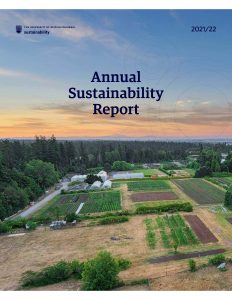CLIMATE & SUSTAINABILITY REPORTING
The Sustainability Office is responsible for campus sustainability performance measurement, regulatory and non-regulatory reporting, communications and benchmarking.
Reporting
UBC Climate Emergency Report
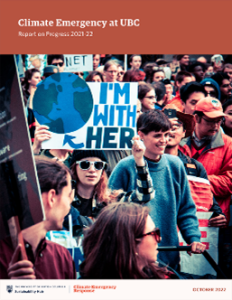
This is the first progress review developed by the UBC Sustainability Hub on UBC’s Climate Emergency since
the Board of Governors and Senates unanimously endorsed in principle the Climate Emergency Task Force (CETF) report in early 2021. UBCO participated in the Climate Emergency, subsequent CETF Report to Board, and informed the recent report on progress.
2021/22 Executive Summary Download
2021/22 Report on Progress Download
—————————————————————————————————-
UBCO CAP 2030 Implementation Progress Report (Annual)
Developed by the UBCO Campus Planning, Sustainability Office, the UBCO CAP2030 Implementation Progress Report provides an Executive Summary of key achievements from the past year that advance the campus towards our 2030 targets.
2022 Progress Report Download
—————————————————————————————————-
UBC Task Force on Climate-Related Financial Disclosures (TCFD) Report
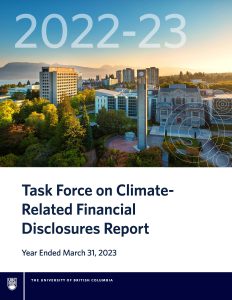 In 2018, the Canadian Government formally endorsed the adoption of Task Force on Climate-Related Financial Disclosures (TCFD) recommendations by all Canadian organizations to support Canada’s commitment to the Paris Agreement.
In 2018, the Canadian Government formally endorsed the adoption of Task Force on Climate-Related Financial Disclosures (TCFD) recommendations by all Canadian organizations to support Canada’s commitment to the Paris Agreement.
UBC endorses the adoption of TCFD recommendations and is committed to producing annual TCFD disclosures alongside supporting TCFD’s global mission of market transparency.
UBC Task Force on Climate-Related Financial Disclosures Report is produced by the Vice President of Financial Operations (VPFO) Office. The Sustainability Office provides UBC Okanagan content for this report.
FY2023 Download
FY2022 Download
—————————————————————————————————-
Regulatory Greenhouse Gas Emissions Reporting
To address climate change, the Government of British Columbia has enacted climate action legislation that frames B.C.’s approach to reducing emissions and transitioning to a low-carbon economy (Climate Action Legislation, n.d.).
Legislated through the Climate Change Accountability Act (CCAA), B.C. is committed to reducing greenhouse gas emissions by 16% below 2007 levels by 2025, 40% by 2030, 60% by 2040 and 80% by 2050. Under B.C.’s Carbon Neutral Government program – legislated under the CCAA – all provincial public sector organizations (PSOs) are required to measure, reduce, offset, verify and report annually on their actions to achieve carbon neutrality.
The Sustainability Office is responsible for compliance with BC’s Provincial legal and regulatory reporting requirements greenhouse gas emissions for the University of British Columbia’s Okanagan campus. We lead the collection and upload of in-scope emissions and the development and maintenance of campus carbon reporting methodology and procedures for quality assurance, quality control, self-certification and verification purposes. We are responsible to produce an annual Climate Change Accountability Report that outlines measures undertaken by the campus, and future planned actions to reduce carbon emissions.
Clean Government Reporting Tool (CGRT) is the provincial reporting platform that measures and aggregates energy use and emissions for buildings, fleets, paper and fugitive emissions.
—————————————————————————————————-
Annual Climate Change Accountability Report (CCAR)
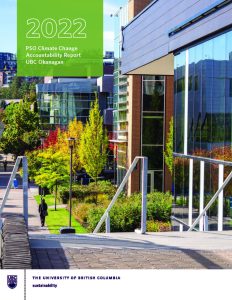 Required by the Climate Change Accountability Act, this report also serves as engagement tool for operational unit level sustainability planning. Provides detailed greenhouse gas emissions and offset summary; emissions source report; actions taken to reduce emissions related to buildings, fleet, paper, travel; and future planned actions. The Sustainability Office produces the UBCO Report and collaborates with the UBC Sustainability Hub and C&CP to produce a broader UBC System Level Report.
Required by the Climate Change Accountability Act, this report also serves as engagement tool for operational unit level sustainability planning. Provides detailed greenhouse gas emissions and offset summary; emissions source report; actions taken to reduce emissions related to buildings, fleet, paper, travel; and future planned actions. The Sustainability Office produces the UBCO Report and collaborates with the UBC Sustainability Hub and C&CP to produce a broader UBC System Level Report.
- 2021 Climate Change Accountability Report
- 2020 Climate Change Accountability Report
- 2019 Carbon Neutral Action Report
- 2018 Carbon Neutral Action Report
- 2017 Carbon Neutral Action Report
- 2016 Carbon Neutral Action Report
- 2015 Carbon Neutral Action Report
- 2014 Carbon Neutral Action Report
- 2013 Carbon Neutral Action Report
- 2012 Carbon Neutral Action Report
- 2011 Carbon Neutral Action Report
- 2010 Carbon Neutral Action Report: Part B for UBC’s Okanagan campus
- 2009 Carbon Neutral Action Report: Part B for UBC’s Okanagan campus
—————————————————————————————————-
Annual GHG Emissions Tracking and Inventories (Present – 2018)
Inventories for our Okanagan campus emissions. 2022 | 2021| 2020 | 2019 | 2018
—————————————————————————————————-
UBC Annual UBC Sustainability Report (ASR)
Required by UBC Board of Governors, UBC Board Policy UP12 (Land Use Policy). Provides summary report and campus metrics for sustainability performance across academic sustainability; operational sustainability (greenhouse gas emissions, energy, water, waste); communication and engagement; integration and future priorities. The report is developed by the UBC Sustainability Hub and C&CP. The Sustainability Office generates campus operational performance metrics, leads UBCO stakeholder input and develops UBCO report content.
Read 2022-23 UBC Annual Sustainability Report
View UBC’s past annual sustainability reports
View 2010-2012 Board of Governors Report
—————————————————————————————————-
UBC Sustainable Development Goals Report (Annual)
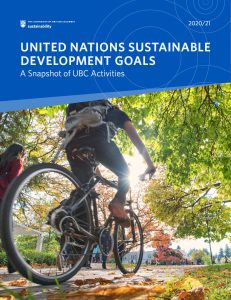 The SDG’s address global challenges related to poverty, inequality, climate, environmental degradation, prosperity, peace and justice. The United Nations Sustainable Development Goals: A Snapshot of UBC Activities (2020/21) report highlights one project or program relating to an operational aspect of each SDG at UBC. This report is produced by the UBC Sustainability Hub with Okanagan data and content from the Sustainability Office.
The SDG’s address global challenges related to poverty, inequality, climate, environmental degradation, prosperity, peace and justice. The United Nations Sustainable Development Goals: A Snapshot of UBC Activities (2020/21) report highlights one project or program relating to an operational aspect of each SDG at UBC. This report is produced by the UBC Sustainability Hub with Okanagan data and content from the Sustainability Office.
——————————————————————————————————————————–
EXTERNAL BENCHMARKING
UBC’s leadership in sustainability is consistently recognized with top marks in third-party rating systems.
—————————————————————————————————-
THE (Times Higher Education)
Since 2004, THE (Times Higher Education) has been providing trusted performance data on universities for students and their families, academics, university leaders, governments and industry. They have created university rankings to assess university performance on the global stage and to provide a resource for readers to understand the different missions and successes of higher education institutions. THE measures UBC’s social and economic contributions through our success on delivering on the United Nations Sustainable Development Goals (SDG’s). The Sustainability Office completes annual operational metrics/data submissions to inform UBC’s overall rankings.
UBC’s rankings:
| RANKING AREAS | 2023 | 2022 | 2021 | 2020 | 2019 |
| OVERALL | 40th | 37th | 34th | 34th | 37th |
| IMPACT | TBD | 13th | 13th | 7th | 3rd |
| SDG 13: CLIMATE ACTION | TBD | 7th | 3rd | 1st | 1st |
Overall = World University Rankings are based on 13 carefully calibrated performance indicators that measure an institution’s performance across four areas: teaching, research, knowledge transfer and international outlook.
Impact = Impact Rankings are the only global performance tables that assess universities against the United Nations’ Sustainable Development Goals (SDGs). THE uses carefully calibrated indicators to provide comprehensive and balanced comparison across four broad areas: research, stewardship, outreach and teaching.
SDG 13 Climate Action = This area measures universities’ research on climate change, their use of energy and their preparations for dealing with the consequences of climate change.
Visit Times Higher Education for more information.
—————————————————————————————————-
Canada’s Greenest Employer
Canada’s Greenest Employers is an editorial competition organized by the Canada’s Top 100 Employers project. This special designation recognizes the employers that lead the nation in creating a culture of environmental awareness in their organizations. These employers have developed exceptional sustainability initiatives – and are attracting people to their organizations because of their environmental leadership. The Sustainability Office provides UBC Okanagan content to inform UBC’s submission.
UBC has been recognized as one of Canada’s Greenest Employers for 12 consecutive years: 2023, 2022, 2021, 2020, 2019, 2018, 2017, 2016, 2015, 2014, 2013, 2012
Visit Canada’s Greenest Employers for more information.
——————————————————————————————————————————–
Past Sustainability Office Publications
shift Magazine
Provides a broad overview to demonstrate how the campus is achieving UBC’s sustainability commitments.
Read more about each:

